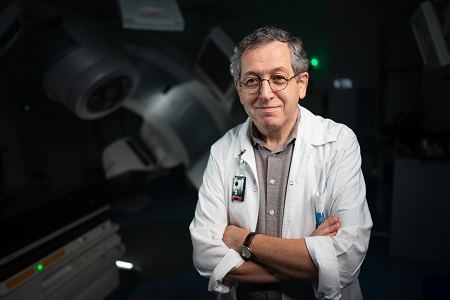
In a newly created video for cancer patients, medical experts at the Hadassah Medical Organization’s Sharett Institute of Oncology urge patients not to forgo cancer treatments because they fear contracting COVID-19 while in the hospital.
“Cancer is a serious disease, often more serious than COVID-19,” Prof. Aron Popovtzer, the new head of the Sharett Institute, says in the video, which is available on Hadassah Hospital’s Facebook page, in both Hebrew and Arabic. “Please continue your treatment and trust your doctors,” he emphasizes.
Prof. Michal Lotem, head of Hadassah’s Center for Melanoma and Cancer Immunotherapy, explains that those receiving immunotherapy need to understand that this therapy strengthens the immune system. She acknowledges that there are side effects with the treatment that are similar to COVID-19 symptoms, for example, tiredness, headaches, and even an increase in temperature.
“Let me first tell you something to ease your concerns,” says Prof. Ayala Hubert, who heads Hadassah’s Gastrointestinal Cancer Center. “None of our patients are infected with the coronavirus. That’s because they are doing the right thing by adhering to social distancing, and we’re taking all those precautions here at the Institute.”
Dr. Azzam Salach from Hadassah Hospital Mount Scopus also urges patients to keep up their treatments. Those requiring preventative treatment must have it at the correct time, she says. However, there can be instances when, after consultation with an oncologist, chronic cancer patients can delay or eliminate a specific treatment and just continue taking oral medicines.
“Radiotherapy is among the most crucial treatments for cancer patients and can even eradicate the disease completely,” says Dr. Marc Wigoda, head of Hadassah’s Radiotherapy Unit. “It’s really important,” he explains, “to have treatment on time and not to break the sequence.”
Radiotherapy treatment, Dr. Wigoda adds, “does not weaken the immune system; rather, it’s a lack of treatment that can greatly increase the slight chance of becoming infected with COVID-19 and infecting others.”
Oncologist Jonathan Cohen urges patients who think they might have a virus, COVID-19 or a different one, to call their doctors to discuss treatment. Prof. Beatrice Uzieli, who specializes in breast cancer, notes that there are often treatment options available to cancer patients that would be more convenient in these unusual times and not put them at risk.
View the video in Hebrew.
Picture caption: Dr. Marc Wigoda, Head of Radiotherapy Linear Accelerator Unit at Hadassah Ein Kerem
